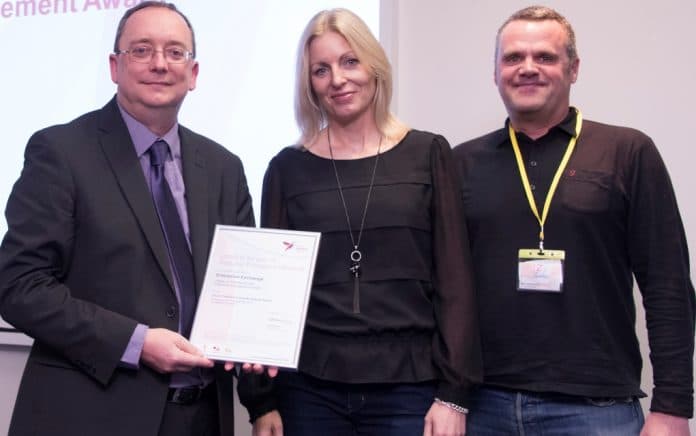
SME catches up with Benna McCartney and Phil Ashford, the driving force behind the Enterprise Exchange
Tell us about the Enterprise Exchange. What do you hope to achieve?
Enterprise Exchange is a social enterprise that specialises in helping people with additional barriers into self employment or starting a business. We run training programs with the long term unemployed, with offenders in prisons and ex-offenders in the community. We also run training programs for welfare to work employment advisers and a management development program for corporate clients, training senior mentors to become enterprise mentors for our clients.
When was your company formed? And why?
We formed in 2010 – Phil was a Director for Business Link, helping the hard to reach into self employment. Benna was running a similar program for Chichester University. The funding ran out for both programs and we decided that the demand for this tailored support was huge and that mainstream business support was not fit for purpose. We ran a research project with offenders in HMP Lewes and HMP Ford, supported by the University of Brighton and designed our training program based on those findings.
Why do you think entrepreneurship is so important?
For offenders it is very difficult to gain employment because of the stigma and need for disclosure when applying for jobs. Research has shown that offenders and ex–offenders often have more entrepreneurial attributes than the general public and we believe that focused properly it can change lives.
What were the biggest challenges in the early days?
Building a reputation and pricing. We eventually got our 1st contract in HMP Lewes delivering our program and that gave us 18 months of case studies and testimonials. We did not charge what we now see as a market rate for the amount of work we were carrying out. We would often take on work from big contractors for little money because we felt we had to. We will not make the same mistake again.
You do a lot of work in the criminal justice system. How has that worked?
We love what we do, but the criminal justice system is in crisis. Funding and staffing have been slashed, institutions are less safe and rehabilitation tends to be done by charities and social enterprises often for little money but with skill and passion. This is unlikely to change in the near future. Also offenders more often than not, have additional barriers of mental health, housing and drugs and alcohol issues, with very little support on the outside. This makes it even more difficult to become self employed.
You’ve linked up with some big companies like John Lewis and Legal & General. How does that work and what advantages does it give you?
We were approached by Legal and General 6 years ago to support us in HMP Lewes. Rather than asking for funding, we devised a mentoring program where we trained senior managers to become enterprise mentors for our clients. We put them on a two day course, then depending on workload, once a week the mentors had a mentoring session with the Mentee. We matched Mentors and Mentees and observed each session, reporting back to the mentor. We discovered the mentees got huge value from this ongoing support and the mentors went back into the workplace with more skills. We ran that over 4 years and have since done the same with John Lewis in Milton Keynes, with very good feedback from both the mentees and the mentors on the program.
Have you got any particular success stories you can share with us?
Panama Joe’s Littlehampton

Joseph came to us through a self-employment course we did with Brighton Probation. He had a dream of running his own Latin American restaurant in Littlehampton, as he had previously and successfully done in Panama. There were many barriers to him gaining funding for his business, such as not having access to a computer and not being computer literate to the degree required for a loan application. We realised that there was no way he was going to get to live his passion if all relevant agencies didn’t pull together to support him, so we teamed up with Joseph’s key worker at Brighton Probation and Biz Britain, to make sure he had all the necessary elements required to put a business plan together and gather everything that was needed.
It was quite a long process as there were essential pieces of information missing (such as ID in the initial instance), but between us we managed to make sure everything was in place and much to our delight he gained even more funding than he was hoping for to start his restaurant. There have been lots of ups and downs since opening night, as there are with most business start-ups, but with ongoing support we believe that Panama Joe’s will carry on being a thriving business within the community.
How do you see the future?
We are not holding our breath for improvements to the criminal justice system, but our strategy is to be the preferred supplier to ethical contractors on a retainer basis in the welfare to work arena. We are looking to partner with further complimentary organisations, to increase the effectiveness and scope of what we can provide and to expand our management development program with corporates nationwide.
What has been the highlight of running Enterprise Exchange?
Phil – Enterprise Exchange having the credibility to be able to provide a management development program to large corporate organisations, which gave amazing additional support to our hard to reach self-employment clients.
Benna – The main highlight for me is gaining our most recent contract with Shaw Trust. After working so hard for so many years, to now be on a retainer for four years enabling us to support more people over a longer period of time, really shows that hard work and determination really pay off.
